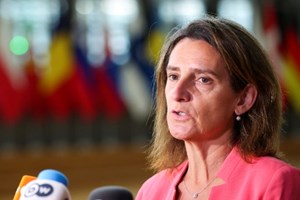The EU will ban Russian LNG 'sooner than later,' Spain’s energy minister says
(Reuters) - European Union countries will agree sooner rather than later to ban import of liquefied natural gas (LNG) from Russia, Spain Energy Minister Teresa Ribera told Reuters on Tuesday.

"This will be coming sooner than later," she said in an interview on Tuesday when asked if the EU will muster the political will for such a move.
With imports of Russian crude and oil products banned and the flow of Russian gas via pipelines sharply reduced, imports of Russian LNG are in the spotlight as the EU tries to deprive Russia of energy export revenue.
In March, EU countries agreed to seek a legal option to stop Russian companies from sending LNG to the bloc.
In March, Ribera sent a letter to LNG importers and major operators in Spain asking them to avoid signing new contracts to buy Russian LNG once the existing contracts have expired. The request followed a similar appeal from EU Energy Commissioner Kadri Simson.
"If we want to be consistent, we need to say we are not going to accept Russian LNG anymore," Ribera said.
"We could all be much more comfortable with that scenario,” she added. "As time goes by, things would be increasingly easier to adopt this decision, banning the imports of LNG from Russia."
All the companies contacted pledged not to sign new contracts, Ribera said.
The appeal to LNG importers is part of increasing efforts from the Spanish government to crack down on the import of Russian energy products.
Spain has already stepped up checks on import papers and has investigated claims that Russian diesel is entering Europe via third countries. However, so far no evidence has emerged that this is happening, Ribera said. The government is in talks with port and customs authorities, she said, acknowledging that it is difficult to track the origin of energy products.
That is why, Ribera said, she is pushing the European Commission to introduce a certification system to track Russian imports and make sure that sanctions are not breached.
Ribera sounded a note of caution over the suggestion by EU foreign policy chief Josep Borrell that the bloc should crack down on India reselling Russian oil into Europe as refined fuel, including diesel.
"Do we adopt measures against the exports of any country where we suspect that there may be this type of operations?" she said, warning that it could be difficult to implement and "sometimes not even fair."
Related News
Related News

- Credit Agricole says it will not fund two major LNG projects
- Aramco awards $7.7-B contracts to add 1.5 Bscfd of raw gas to Fadhili Gas Plant
- Japan's JERA suspends output at 4 gas-fired power plants to secure LNG stocks
- LNG Canada expansion to be decided by 2025
- TotalEnergies: Papua LNG project requires 'more work' to reach final investment decision



Comments